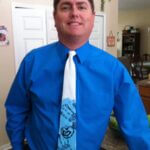Religion teaches us many ways to worship … just about all of them are very scripted. In modern Judaism, we have the Siddur to tell us exactly what to do and when to do it. “On Friday add this prayer …”
In many churches, people light candles in order to obtain some favor. Some religions tell you to visit places like Mecca or Vatican City or even the Western Wall to be close to God.
But the truth is, God is not in Mecca, or the Vatican or even at the Western Wall. As a Jew, I love to visit the Western Wall, but not because I think that the presence of God is stronger there than in other places. I go because it is a part of my history and my people.
The Bible says that the presence of God is no longer in buildings: “However, the Most High does not live in houses made by human hands…” (Acts 7:48). So where is He?
We are the temple of the living God. As God has said, “I will dwell in them and walk among them. I will be their God, and they shall be my people” (2 Cor. 6:16).
“Don’t you know that you yourselves are God’s temple and that God’s Spirit dwells in your midst?” (1 Cor. 3:16, NIV)
God is in us, not at some “holy site.” Where we are, the presence of God is!
Some religions focus on people. Just as Catholics will kiss the ring of the pope (not very sanitary) in order to get a blessing, religious Jews will visit certain rabbis—even dead ones—to receive spiritual power. In fact, each January about 100,000 Jews will visit the gravesite of the famous Moroccan Rabbi Baba Sali in hopes of receiving a blessing. Sadly, dead men can’t lay hands on you and impart spiritual life.
Others will put a picture of him on their wall as an act of worship. Again—it won’t help. In fact, seeking spiritual power from visiting graves and praying to dead people is witchcraft. It is the opposite of the picture of worship that we see in the Bible.
How Can We Worship?
The Bible tells us how to worship and it has nothing to do with traditions or customs or dead people! Immediately following the Shema, the greatest creed in Judaism, we find another famous passage that we call “The V’ahavta”:
“Love the Lord your God with all your heart and with all your soul and with all your strength.” (Deut. 6:5, NIV)
This is how we express love to God—with all of our heart, devotion, strength, loyalty, passion and soul. We express our love to God as if we know him. If you wanted something from me, you would not ask my picture, light a candle or visit my birthplace, or God-forbid, my grave—you would simply ask me. We talk to God as if he is our friend, as well as King.
NFL vs. Worship
I have been to three NFL games in my life and I have no desire to go to another. I love football, but I prefer TV. The atmosphere at a professional football game borders on worship and lunacy. Thousands dress up, paint themselves and scream to the heavens for their team. And the funny thing is, we think nothing of it. In fact, we often respect their devotion.
However, the minute someone expresses similar zeal in worshiping the living God, we are tempted to judge them as proud, weird or extreme. When Oprah gave away cars to her entire audience in 2004, these women went crazy, screaming and crying. For what, a $20,000 car?
Okay … I get that … I would be pretty excited too to receive a free car, but you have received something far more valuable than a new car. Your name has been written in heaven. If getting a free car evokes such a response, how much more should the people of God respond to the fact that we will never die! Our names are written in heaven! We will be with Him forever!!!
Note: This is the first of a four-part series. In Part 2, Ron will take a look at the best Old Testament example of New Testament worship—King David.
Ron Cantor is the director of Messiah’s Mandate International in Israel, a Messianic Ministry dedicated to taking the message of Jesus from Israel to the ends of the earth (Acts 1:8). Ron also travels internationally teaching on the Jewish roots of the New Testament. He serves on the pastoral team of Tiferet Yeshua, a Hebrew-speaking congregation in Tel Aviv. His newest book, Identity Theft, will be released on April 16th. Follow him at @RonSCantor on Twitter.








Leave a Comment
You must be logged in to post a comment.